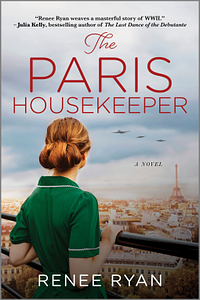You need to sign in or sign up before continuing.
Take a photo of a barcode or cover
emotional
sad
medium-paced
Plot or Character Driven:
Character
Strong character development:
Yes
Loveable characters:
Complicated
Diverse cast of characters:
Yes
Well written and full of realistic and relatable characters. I liked that much of it showed how gray circumstances and scenarios were during the war. While there was plenty that was black and white, right and wrong, there was still more that was ambiguous and blurred. Betrayal vs Sacrifice really was a great theme.
I liked Camille so much and I even respected Vivian in her flaws, as much as I very often didn’t want to. I thought her character provided a great opportunity to evaluate what you would do in her position when it’s not so cut and dry. And I thought Rachel was well painted in her struggle with constant fear and anger at her situation.
Thanks to Netgalley for the advanced copy of this book. All opinions are mine.
I liked Camille so much and I even respected Vivian in her flaws, as much as I very often didn’t want to. I thought her character provided a great opportunity to evaluate what you would do in her position when it’s not so cut and dry. And I thought Rachel was well painted in her struggle with constant fear and anger at her situation.
Thanks to Netgalley for the advanced copy of this book. All opinions are mine.
emotional
inspiring
sad
tense
medium-paced
I’m a professional history nerd and a small facet of my job is talking about American women’s experiences during World War II. I was so excited for the chance to read “The Paris Housekeeper” by Renee Ryan and read about the fictional experiences of three very different women in Paris during the German occupation.
When Germany seized control of Paris in June 1941, not everyone was able to escape. People like Camille Lacroix, employed at the Hôtel Ritz, could not afford to leave behind a job that supports her windowed mother and sisters. Desperate to provide for them, Camille takes up work as a lady’s maid for the hotel guest Vivian Miller.
Vivian is a beautiful and fabulously wealthy American widow…and a Nazi sympathizer. Camille doesn’t trust her, but has no choice but to turn to Vivian for help getting her friend Rachel Berman out of the city. For Vivian has been using her money and connections to obtain forged travel papers for Jewish refugees and agrees to help Rachel.
As Nazi control grows, Rachel and her mother are in increasing danger, motivating Camille to hide the two women in a secret underground bunker right under the nose of a Nazi officer. But the women know that time is running out and Rachel and her mother need to get out before it’s too late.
“The Paris Housekeeper” was a stressful tale of three very different women trying to navigate life in 1940s Paris during the Nazi occupation. The women’s stories intersect at multiple times and their fates become irrevocably entwined as they try to help one of them—a woman of Jewish heritage—escape France with her mother.
Ryan wove an interesting story and utilized real people and events to influence her characters. The character of Camille, who is the housekeeper referenced in the book’s title, is the most fleshed out of the three women we see. She left behind her family and her guilt for a better paying job at the Hôtel Ritz. We see her thoughts are constantly about her family and quickly about Rachel and what she could do to protect them from the Nazis. Camille is faced with many difficult and dangerous decisions but puts her fear aside to do what she thinks is right.
Rachel Berman is the most interesting character of the book. She goes through the most in the book, seeing the men in her neighborhood arrested and sent away shortly after the occupation began and increasingly fearing for her mother and herself. Ryan portrayed Rachel as very angry through the book, which I thought was a great choice because it gave her more agency. She was mad at her family for not seeing the writing on the wall when the German Army was approaching France, furious that they wouldn’t leave their home but powerless to do anything. She was upset about the deteriorating conditions at work and the poor treatment by her coworkers and neighbors. She was also angry at Camille, because Rachel needed to rely on her help to escape. And most of all, Rachel was angry that there was nothing she could do herself. A lot of fictional stories that incorporate Jewish people during World War II paint them as resigned and fearful, but they were not one-dimensional and should not be portrayed as such.
Arguably the least interesting character was Vivian Miller. She became the mistress of a Nazi officer in order to continue her work of gathering forged travel documents for Jewish refugees and sometimes expressed her hatred of him and her actions and sometimes seemed complacent. While this could have been a fascinating decision on Ryan’s part, having Vivian struggle with her morals or even begin to suffer from a sort of Stockholm Syndrome, it comes across instead that the author was too wishy-washy with the character and didn’t fully develop her character.
In all, “The Paris Housekeeper” was a well written fictional story inspired by true events. It was tense and stressful—as it should be given the topic—but also filled with quiet, heartfelt moments. Ryan balanced the multiple POVs of the three female leads well and developed several interesting characters.
A note on a historical inaccuracy that I’m probably the only person to be bothered by: Vivian makes a few comments about her experiences in World War I with the Red Cross. She makes a point to specify that she was a “combat nurse,” but those did not exist in either World War I or World War II. The War Department refused to allow women to be classified as combatants of any kind during either war. I suppose it’s possible she served as a “combat nurse” with another country’s Red Cross, but that wasn’t really a term used by any nation as far as I’m aware. It is also clearly established that she’s an American, so this further seems unlikely. Vivian’s experiences would still read the same if she referred to herself as a nurse and it would be historically correct.
I received a digital ARC of this book through NetGalley in exchange for an honest review.
I received a digital ARC of this book through NetGalley in exchange for an honest review.
Moderate: Genocide, Hate crime, Mental illness, Suicide, Violence, Blood, Antisemitism, Grief, Religious bigotry, Murder, War, Injury/Injury detail
Minor: Death, Sexual violence, Death of parent


